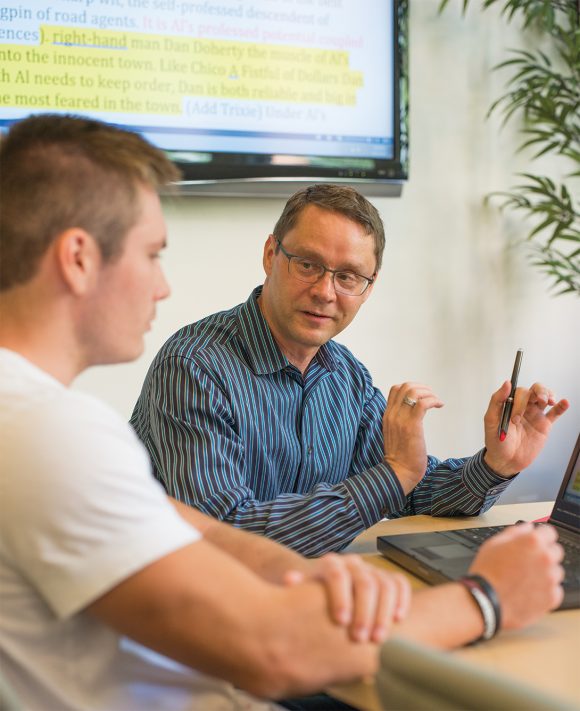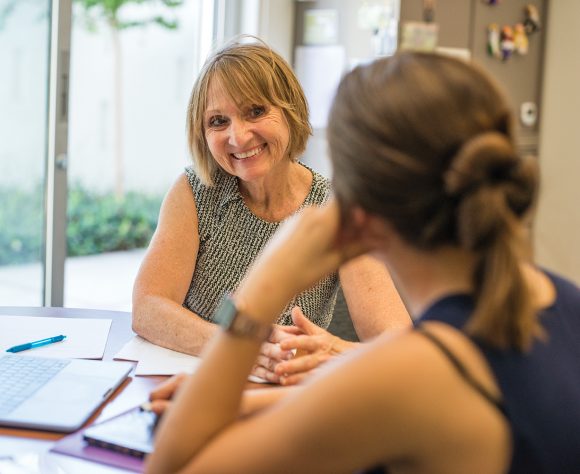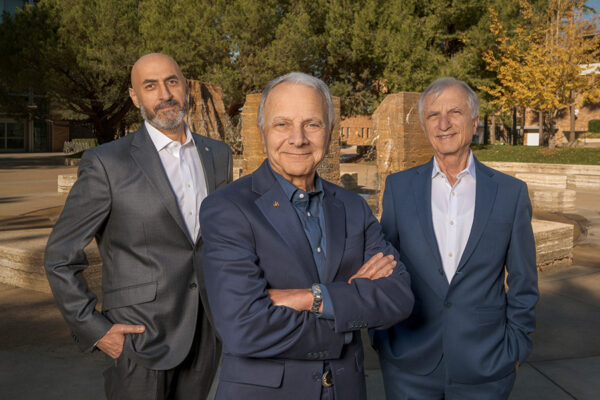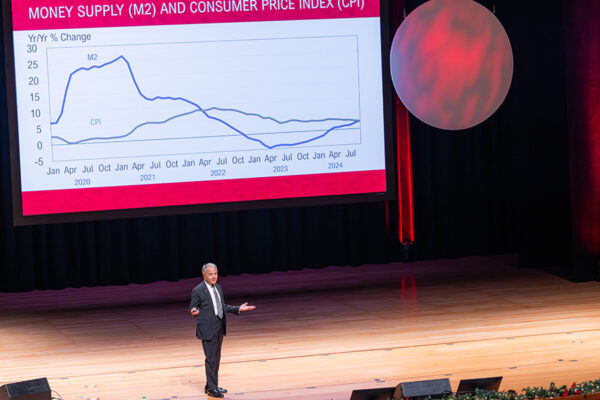
Call it economics with a human face. At Chapman University’s new Smith Institute for Political Economy and Philosophy, the focus is on humanomics – a mind-bending inquiry into the intersection of economics and the humanities. Through seminars and research projects, the journey is taking students and faculty into uncharted territory and attracting wider attention with a new book, journal articles and the institute’s first international conference.
“People don’t typically think of morality and humanity as important in economics,” says institute director Bart Wilson, Ph.D., who holds the Donald P. Kennedy Chair in Economics and Law at Chapman. “There’s this idea that economics is heartless, objective, based solely on cold, hard facts. And I think the presumption in literature and philosophy is often that economics is morally bankrupt.”
But in humanomics, Wilson and others are questioning these assumptions.
“In our first course, we asked students to think about what makes nations rich, what makes good people good – and what those two things have to do with each other. We’re still asking those questions,” he says.
The institute opened in 2016, supported by more than $15 million in gifts from the Charles Koch Foundation and two anonymous donors, with additional funding from Chapman trustees Gavin Herbert and Rick Muth (MBA’81). The institute’s name honors both Adam Smith (1723-1790), the moral philosopher widely known for authoring “The Wealth of Nations” and “The Theory of Moral Sentiments” – books that launched the field of economics; and Chapman Professor Vernon Smith, Ph.D., the 2002 Nobel laureate in economics and the father of experimental economics.
“The Smith Institute’s broad mission is to reintegrate the study of the humanities and economics in the spirit of Adam Smith, and to recombine research and undergraduate education as a discovery process in the spirit of Vernon Smith,” Wilson explains.
TWO-WAY INQUIRY
That mission got its start in 2010, when Wilson and Jan Osborn, Ph.D., associate professor of English at Chapman, co-taught a First-Year Foundations seminar titled Humanomics: Exchange and the Human Condition. The course juxtaposed John Steinbeck’s harrowing Dust Bowl novel “The Grapes of Wrath” with journalist Matt Ridley’s upbeat 2010 book “The Rational Optimist: How Prosperity Evolves.”
“Each book questioned the other’s premise,” Osborn says. “Reading the two together deepened the inquiry both ways.”
The idea for the course and the term humanomics emerged from an ongoing conversation between Osborn and Wilson about the deep disconnect between economics and the humanities.
“Literature is about the human experience. But the charts and graphs and numbers of economics are all about human beings, too,” Osborn notes. “We put two major works into conversation with each other and as a result see things in a new way. There are no right answers – it’s about generating new questions and living with new ambiguities.”
Wilson and Osborn expected to teach the class once and move on. Instead, humanomics snowballed thanks to student demand. In 2011, Wilson and Osborn added a Presidential Seminar, in which students and faculty discuss the arts, humanities, philosophy and economics over dinner in a Socratic dialogue format. The seminar has been offered every semester since. The foundations class, which won Chapman’s 2011-2012 Pedagogical Innovation Award, is offered every fall. An Interterm course was added in 2014. Along the way, Keith Hankins, Ph.D., assistant professor of philosophy, and others began teaching humanomics courses as well. The institute is adding 10 new faculty positions in economics, the humanities, literature and philosophy.
Vernon Smith sat in on the first seminar – and was intrigued by humanomics’ “let’s ask new questions” approach. He and Wilson have co-authored the new book “Humanomics: Moral Sentiments and the Wealth of Nations for the Twenty-First Century,” published this fall by Cambridge University Press. Among the scholars to praise the book is Deirdre Nansen McCloskey, distinguished professor of economics, history, English and communication at the University of Illinois at Chicago. She called it “a scientific and ethical triumph (that) combines the sacred and the profane, just as we do.”
NEW TAKES ON EXPERIMENTS
Smith and Wilson also collaborated on innovative experiments that test the role of humanomics’ human variables in how people make economic decisions.
In one study published this year in the journal “Games and Economic Behavior,” they tweaked the rules of a classic experiment called the ultimatum game. “We redesigned it to test Adam Smith’s proposition in ‘The Theory of Moral Sentiments’ that ‘beneficence is always free, it cannot be extorted by force,’” Wilson says. They found that when responders were given the ability to opt out of the ultimatum game for a mere $1 payoff, 40 percent of proposers offered a $22-to-$2 split to the responders (in favor of the proposer) and that, contrary to the results in the standard ultimatum game, 61 percent of the responders accepted such grossly “unfair” offers. “Reading Adam Smith gave us the idea to run an experiment that we had no reason to run before,” Wilson says, “and the result was a re-interpretation of the ultimatum game as plausibly as much about extortion as it is about fairness.”

In a study published in July in the prestigious journal “Nature Human Behaviour,” Wilson and Smith – along with Chapman anthropologists Hillard Kaplan, Ph.D., and Eric Schniter, Ph.D. – looked at what happens when people can choose between stealing and sharing food resources. Would they coldly maximize their own gains at the expense of others, as conventional economics might predict? The results surprised Wilson.
“We tend to think that people are instinctively selfish, and in our experiment they initially are,” he says. “So it’s pretty remarkable how humans find a way to cooperate and trade after the initial rampages of theft. I didn’t expect such a clear result. It surprised me how much stealing declined over time. The uncertainty of the future helps prepare people to be more cooperative.”
Students have also worked with Osborn and Wilson to publish academic papers based on humanomics classes. One recent example explores the connection between human social connection and morality using Smith’s “Theory of Moral Sentiments” and Mary Shelley’s “Frankenstein.” Another student is analyzing characters from the TV series “Deadwood” as they react to commercial and economic forces.
“Vernon Smith’s long-held view is, ‘Why can’t the classroom be the place that generates ideas for research?’” Wilson notes. “We’re making that happen.”
The institute’s first academic meeting – a conference on property and political economy – featured speakers from major universities in the U.S., Canada, Australia and Spain. Meanwhile, undergraduates can apply for spots in the institute’s Summer Scholars program, where they analyze data, design new experiments and ponder works of literature and economics.
It’s a mind-opening experience, says Chapman business administration major Kyle Joye ’21.
“Humanomics class taught me to constantly think about economic solutions to better humanity,” Joye wrote about the program in his application for the summer scholars program. “Talking about bettering society, seeing where flaws exist and learning from experts excites me because it shows that we are capable of finding solutions to serious problems like the national debt and welfare. I want to make the world a better place, and I feel like this approach will work toward that goal.”



